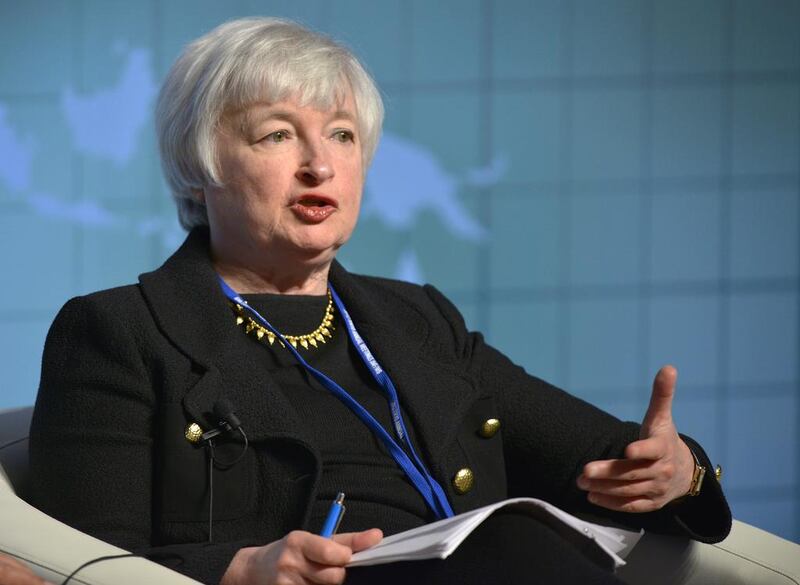Janet Yellen was expected to be nominated as the Federal Reserve chairwoman yesterday, news that offered a chink of relief to investors fretting about the debt stand-off in the United States.
The current deputy at the Fed, Ms Yellen has been viewed favourably by market observers because of her likely cautious approach to turning off the taps on economic stimulus.
Her nomination comes as global markets wait for signs of a breakthrough in the US budget deadlock. The MSCI Emerging Markets Index dipped 0.4 per cent to 1,005.35 in late afternoon trading in Hong Kong, the most in a week.
Further dampening the mood was a cut by the IMF in its global growth forecast for this year from 3.1 per cent to 2.9 per cent, mainly due to emerging market weakness.
Ms Yellen will become one of the most powerful women in the global finance industry when she takes over from the current Fed chairman Ben Bernanke on February 1.
“Her nomination will be seen as representing broad continuity with the dovish policy approach of her predecessor, although it may raise a few more questions about the speed with which QE [quantitative easing] will be reduced and ultimately ended,” wrote Tim Fox, the chief economist of Emirates NBD, in a research note.
Barack Obama was expected to formally nominate her in the afternoon after the withdrawal of his preferred candidate, the former treasury secretary Larry Summers last month amid opposition from Democratic senators.
Her first job is likely to be overseeing the winding-down of a monetary policy that has helped to lift the US economy into recovery but flooded emerging markets with cheap liquidity and risked stoking inflation.
Markets were surprised last month when the Fed opted to maintain its cash injections of US$85 billion a month in full, rather than begin tapering.
In the short term, investors remain preoccupied by the outcome in the US debt talks. The stalemate has closed the government since the start of the month and raised the threat of a default if policymakers fail to raise the $16.7 trillion debt ceiling by an October 17 deadline.
Mr Obama has said he would be open to negotiation if Republicans agree to get the government back to work and raise the debt ceiling without conditions. The Republican house speaker John Boehner has expressed disappointment at the offer.
“Should the US government shutdown last for longer than expected, the US economy will see a dent, similar to what has been the case at the end of last year/beginning of this year,” said Janwillem Acket, the chief economist at Julius Baer, a private bank.
Ahead of Ms Yellen’s nomination, global markets were mixed yesterday. Britain’s FTSE 100 was 0.12 per cent lower at 6,357.93, while Hong Kong’s Hang Seng Index closed 0.63 per cent lower at 23,033.97. Most other major stocks were in the black.
As the IMF lowered its global outlook for this year and next, it also warned a US default could “seriously damage” the world economy.
In the IMF’s latest World Economic Outlook, it said prospects for growth in the wider Middle East and North Africa region this year were dimmer. Forecasts for the region were lowered to 2.1 per cent, compared with 3.1 per cent in its previous outlook released in May.
The downgrade was largely down to lower oil output in Libya, Iraq and Iran.
The IMF raised to 4 per cent its forecast for UAE growth this year, the only GCC country to have an upgrade to its outlook.
Separately, it was announced yesterday that a delegation led by Obaid bin Humaid Al Tayer, the Minister of State for Financial Affairs, and Sultan Al Suwaidi, the Governor of the Central Bank, would participate in the annual meetings of the World Bank and the IMF, which start tomorrow in Washington.
tarnold@thenational.ae





